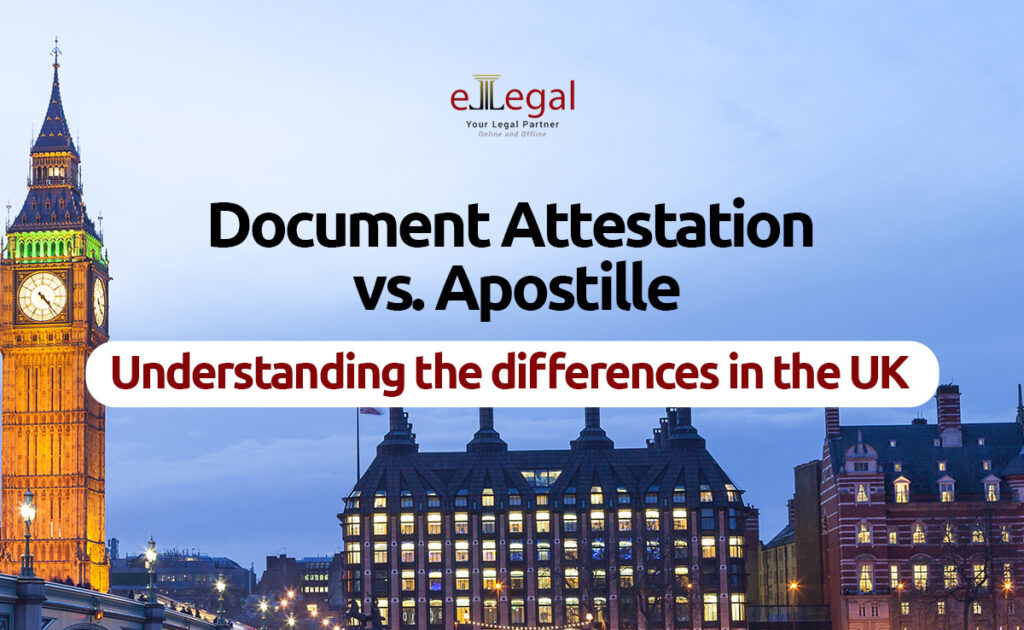In today’s global landscape, the demand for document authentication is more significant than ever. Whether you’re planning to move overseas, applying for a visa, or handling international legal affairs, it’s vital to understand the distinctions between document attestation and apostille. The processes in the UK can be somewhat tricky, but they each serve specific roles and have different steps. This blog will help clear up any confusion, focusing on the UK’s practices, including insights on getting documents apostilled in the UK, the prices, and more.
What is a Document Attestation?
Attestation is about verifying that a statement, certificate, or document is authentic and accurate, ensuring it aligns with established standards, regulations, or legal requirements. This verification can be performed by a knowledgeable third party or an individual with the appropriate skills and authority. Attestation is frequently used in various industries to reassure stakeholders that the information is reliable and trustworthy. The results of this process can help lower risks, boost transparency and accountability, and offer evidence of due diligence. The following are examples of documents that will need to be attested:
– Educational degrees and certificates
– Birth and death certificates
– Marriage and divorce certificates
– Adoption certificates
– Court documents and ACRO police records
– Passports – Driving licenses – Financial paperwork.
How To Prepare Your Documents for Attestation
When preparing your documents for attestation, it’s essential to ensure they are organized and error-free. Here are some tips to help you get everything ready for the attestation process:
– Confirm that all information is accurate and up to date.
– Check for any spelling or grammatical errors.
– Make sure all necessary pages are included and the documents are complete.
– Arrange the documents in the order specified by the attestation authorities.
– If translations are required, ensure they are done by a qualified professional.
– Keep copies of all documents for your own reference.
By following these steps, you can ensure your documents are properly prepared for attestation.
Document Attestation Process
The attestation process is all about having your documents checked for authenticity by the right authorities. Usually, this means you’ll need to show your original documents along with their photocopies and any additional paperwork that the attesting agency might ask for. The specific steps can differ based on the type of document and the country where you want the attestation to be accepted. However, it generally follows a few key steps
- Notarization: The document is first notarized by a notary public. This confirms that the document is genuine and has been signed by the rightful person.
- Legalization by the Foreign and Commonwealth Office (FCO): After notarization, the document needs to be legalized by the FCO or a similar government department, which verifies that the notary’s signature is legitimate.
- Embassy/Consulate Attestation: Finally, the document is presented to the embassy or consulate of the destination country for final attestation.
What is an Apostille?
The apostille is a specific form of authentication used under the Hague Convention of 1961. It simplifies the process of document verification for international use by providing a standard form of certification. Unlike general attestation, which might require multiple steps, an apostille is a single certificate affixed to the document, verifying its authenticity for countries that are parties to the Hague Convention.
Key Aspects of the Apostille Process:
- Issuing Authority: In the UK, the apostille is issued by the Legalisation Office, a part of the Foreign, Commonwealth & Development Office (FCDO).
- Uniform Format: The apostille certificate follows a standard format and includes information about the document’s origin and the authority issuing it.
- International Recognition: Documents with an apostille are recognized by all countries that are part of the Hague Convention without further verification.
The following documents need an Apostille Certificate:
– Students planning to study abroad must present Apostille-certified education certificates and proof of attendance for further studies or work visa applications.
– Passports – Birth Certificates
– Government-issued ID cards
– Death Certificates and Power of Attorney documents, especially when dealing with property owned in another country after the owner’s passing.
– Marriage Certificates Additionally, corporate documents like business permits and incorporation letters also require Apostille Certificates.
Getting Documents Apostilled in the UK
There are two kinds of apostille available. You can choose between:
Paper-based: This option requires you to send your documents through the mail or deliver them in person if you’re a registered business.
Electronic: Referred to as an ‘e-Apostille’, this method involves uploading your documents as PDF files that have been electronically signed by a UK notary or solicitor. You can apply for this type of apostille online.
While you have the flexibility to choose, you might need to opt for a paper-based apostille in certain situations
Getting documents apostilled in the UK involves a few straightforward steps:
- Prepare Your Documents: Ensure that your documents are complete and correctly notarized if necessary.
- Submit for Apostille: You can apply for an apostille through the Legalisation Office UK, which is the body responsible for this process. For convenience, getting documents apostilled UK online is an option, allowing you to submit your request through their online service.
- Receive Your Apostille: The apostille is typically issued within a few days. The time may vary based on whether you choose standard or expedited services.
Apostille UK Price and Service Options
The apostille UK price can vary depending on several factors, including the type of document and the service level you choose. Here’s a brief overview of what you might expect:
- Standard Service: Generally, the cost for standard apostille service is lower. The typical processing time is around 2-3 working days.
- Expedited Service: If you need the apostille urgently, an expedited service is available at a higher cost. This service usually processes documents within 24 hours.
Conclusion
Understanding the differences between document attestation and apostille is essential for navigating international legal requirements. In the UK, getting documents apostilled is a streamlined process through the Legalisation Office, with various service levels to suit your needs. Whether you are seeking the cheapest apostille service UK or need to know the apostille UK price, knowing your options can help you manage your document legalization efficiently. We at eLegal Consultants are well versed in such matters, we are always available to help you out. Contact us today




